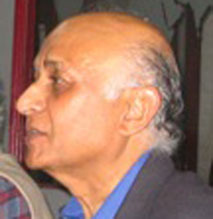The best analysis I’ve read about the failed Iraqi army assault on the Shiite militias in Basra far surpasses anything I’ve seen in The New York Times, the Washington Post, or the Los Angeles Times.
Written by M.K. Bhadrakumar, a former career diplomat in India’s Foreign Service, it ran a couple of days ago in the Asia Times. The headline, “Iran torpedoes U.S. plans for Iraqi oil,” gives only a hint of what has happened.
But “oil” is an important hint, and you don’t find it mentioned in any of the NYT, WashPost, or LAT takeouts. (I wonder why.) Meanwhile, Bhadrakumar offers a lot more to chew on while we await the Senate testimony of Gen. David Petraeus, the top U.S. commander in Iraq.
For instance, chew on this:
It appears that one of the most shadowy figures of the Iranian security establishment, General Qassem Suleimani, commander of the Quds Force of Iranian Revolutionary Guards Corps, personally mediated in the intra-Iraqi Shi’ite negotiations [to end the fighting]. …
US military commanders routinely blame the Quds for all their woes in Iraq. The fact that the representatives of [the] Da’wa [Party] and SIIC [the Supreme Islamic Iraqi Council] secretly traveled to Qom [in Iran] under the very nose of American and British intelligence and sought Quds mediation to broker a deal conveys a huge political message.
Now swallow this:
Anyone who knows today’s anarchic Iraq would realize that triggering a new spiral of violence in that country may not require much ingenuity, muscle power or political clout.
But to be able to summarily cry halt to cascading violence, and to achieve that precisely in about 48 hours, well, that’s an altogether impressive capability in political terms. In this case, the Iranians have managed it with felicitous ease, as if they were just turning off a well-lubricated tap.
Wash it down with this:
Out of the dramatic developments of the past week, several questions arise, the principal being that the Bush administration’s triumphalism over the so-called Iraq “surge” strategy has become irredeemably farcical, and, two, US doublespeak has become badly exposed. What stands out is that Washington promoted the latest round of violence in Basra, whereas Iran cried halt to it.
Here’s a tasty hors d’oeuvre:
Iraqi Prime Minister Nuri al-Maliki, who was camping in Basra and personally supervising the operations against the Mahdi Army [the Sadrist Shiite faction], was not in the loop about the goings-on. As for US President George W Bush, he had just spoken praising Maliki for waging a “historic and decisive” battle against the Mahdi Army, which he said was “a defining moment” in the history of a “free Iraq”. Both Maliki and Bush look very foolish.
Getting on to the main dish:
What has happened is essentially that Iran has frustrated the joint US-British objective of gaining control of Basra, without which the strategy of establishing control over the fabulous oil fields of southern Iraq will not work. Control of Basra is a pre-requisite before American oil majors make their multi-billion investments to kick start large-scale oil production in Iraq. Iraq’s Southern Oil Company is headquartered in Basra. Highly strategic installations are concentrated in the region, such as pipeline networks, pumping stations, refineries and loading terminals. The American oil majors will insist on fastening these installations.
The game plan for control of Basra now needs to be reworked. The idea was to take Basra in hand now so that the Sadrists would be thwarted from taking over the local administration in elections in October — in other words, to ensure the political underpinning for Basra. All indications are that the Sadrists are riding a huge wave of popular support. They have caught the imagination of the poor, downtrodden, dispossessed masses in the majority Shi’ite community. They are hard to replace in democratic elections. The sense of frustration in Washington and London must be very deep that Basra is not yet fastened. Time is running out for Bush to make sure that his successor in the White House inherits an irreversible process in the US’s Iraq policy.
Ready for dessert?
US Secretary of Defense Robert Gates put on a brave face, saying first-hand information was limited, but based on that, “they [Iraqi troops] seem to have done a pretty good job”. To be sure, Cheney must be furious that Tehran torpedoed the entire US strategy for Big Oil. He has had a hard time shepherding the pro-West Arab regimes in the region, especially Saudi Arabia, up to this point.
Besides, nothing infuriates Cheney more than when US oil interests are hit. Thus, the most critical few weeks in the decades-long US-Iran standoff may have just begun. Last week, five former US secretaries of state who served in Democratic and Republican administrations – Henry Kissinger, James Baker, Warren Christopher, Madeline Albright and Colin Powell – sat at a round-table discussion in Athens and reached a consensus to urge the next US administration to open a line of dialogue with Iran.


Thanks, Jan. A lot there I didn’t know, and it makes more sense than the accounts in the US press. Naturally.